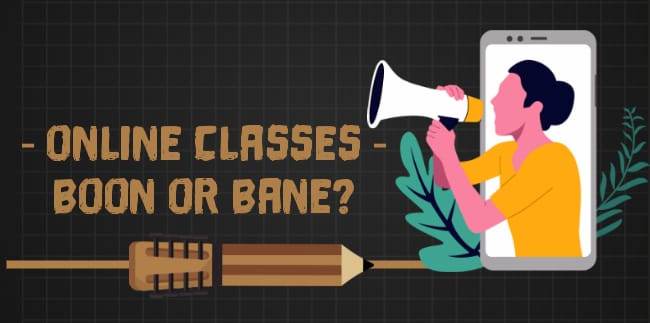- Home » Online classes: Boon or Bane?
Online classes: Boon or Bane?

- by Monica Dhir
- May 10, 2020
- 0 comments
Online classes: Boon or Bane?
In the last few days, we have discovered that several schools in India have started online classes to bridge the gap between students and teachers, because schools have been closed due to the Covid-19 pandemic, since the 21st of March 2020.
The major challenge according to me in front of the students, parents, school management, and teachers is the timing of this lock-down. Because when we talk about students, their exams were still in the process at that time and due to the global emergency which occurred unexpectedly, the lock-down was inevitable; stakeholders too didn’t get time to come up with a planned alternative.
Welcoming many diseases
Usually, students do have a custom of two months of summer vacations where teachers use to give them assignment-based projects but in this particular circumstances students were not having their books of the new term with them and they had not even interacted with their new teachers and suddenly this lock-down and online classes started.
Initially everything seems ideal but as the pandemic escalated, the quarantine span extended respectively. This process transformed into a penance for the students as they weren’t able to cope with their problems, like raising doubts during online sessions, sitting in front of the screen for long hours, and they were not accustomed to getting more homework. This whole scenario is not at all healthy; this is welcoming many diseases.
In this sensitive age, their eyes are exposed a little too much to the screen and most of the students are suffering from computer vision syndrome, it is proven that our eyelids would blink for a very less rate while working on computers, this would aggravate if we are working in an air-conditioned atmosphere, it includes watery eyes, dry eyes, swelling and reddening of eyes, etc.
Gadgets and Mental Health
The National Institute of Mental Health and Neurosciences (NIMHANS) has been studying the increased dependency on gadgets among adults and children amid the lock-down and monitoring its impact on mental health the internet exposure puts children at the risk of “online sexual exploitation” too. All the contributors; even old age teachers are focusing more on gadgets, as it is scientifically proven that when you follow a routine for 21 days, it becomes your habit and, now kids are not able to pursue their studies without online gadgets and this is going to create a very serious problem in the coming future.
Testing time of lock-down
Middle and upper-middle-class parents are appreciating online classes as they don’t have to worry about the academics of their children during this testing time of lock-down. For postgraduate students, a lot depends on the discussion, as a group. The Delhi University Teachers’ Association (DUTA) has written to the VC saying going online is not viable for DU with its “diverse student population, and must not even be considered.” Most of the time entire class is not able to join. Some students have gone back home to remote areas (small towns and villages) where the internet service is not good enough.
In a report issued on 21 April, the United Nations Educational, Scientific and Cultural Organisation (UNESCO), a multi-dimensional agency, highlighted another concern about the online shift. Giving a global perspective, UNESCO noted, “Half of the total number of learners — some 826 million (82.6 crore) students — kept out of the classroom by the Covid-19 pandemic, do not have access to a household computer and 43 percent (706 million or 70.6 crore) have no internet at home, at a time when digitally-based distance learning is used to ensure educational continuity in the vast majority of countries.”
Zoom classes got hacked
Most of the schools are using the ”Zoom” application for online classes but there have been complaints of people hacking into the Zoom classes and abusing participants on the group chats and harassing the teachers and students. Even when students join in they switch off their video and audio to save data — this takes away the advantage of the virtual classroom. Earlier this month, the Ministry of Home Affairs flagged security concerns about the Zoom app.
Many stories are coming out in this particular situation and regarding the systems followed by different countries. For example, in New York, (which is a developed state) things are quite different they are using software like Blackboard similar to Google Classroom but they do have the proper training for about a week and have been giving laptops and free internet to use it, without any interruptions.
In my opinion books can transform this set-up, if books are going to be in the hands of students then this pressure of online classes and spending long hours in front of the screen and hurling their health issues can change.

0 Comments